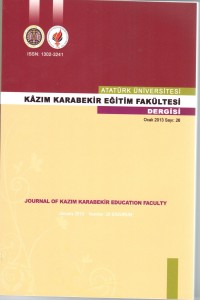KOORDİNASYON İLE BEDEN EĞİTİMİ ÖĞRETİM YÖNTEMİNİN 9 – 10 YAŞ GRUBU ÇOCUKLARIN MOTOR BECERİLERİNİN GELİŞİMİNE ETKİSİ / The Effect of Physical Education Teaching Methods and Coordination to Development of Motor Skills for 9-10 Years old Children.
Öz
Bu araştırmada, 9 – 10 yaş ilköğretim birinci kademe dönemindeki
çocuklara uygulanan 10 haftalık koordinasyon içerikli beden eğitimi ders
programının çocukların bazı motor becerilerinin gelişimine etkileri incelendi.
Araştırmaya 41 öğrenci deney ve 41 öğrenci kontrol grubu olmak üzere
toplam 82 erkek öğrenci gönüllü olarak katıldı. Kontrol grubu normal beden
eğitimi ders programına devam ederken deney grubu 10 haftalık koordinasyon
içerikli ders programına devam etti.
Programın başlangıcında ve sonunda her iki gruba, statik (flamingo)
denge, ayak ile top kontrol, halkaya top atma ve çabukluk testleri uygulandı.
Verilerin analizinde grup içi karşılaştırmalar için eşleştirilmiş t testi,
gruplar arası karşılaştırmalar için bağımsız t testi kullanıldı.
İstatistik sonuçlarına göre, deney ve kontrol grubunun ön test değerleri
arasında tüm değişkenlerde anlamlı bir farklılığa rastlanmadı (p>.05). Deney ve kontrol grubunun son test statik (flamingo) denge, ayak ile top
kontrol, halkaya top atma ve çabukluk (sağ ve sol) değerleri arasında deney
grubu lehine anlamlı farklılıklar bulundu (p<.001).
Deney grubunun ön–son test statik (flamingo) denge, ayak ile top kontrol,
halkaya top atma ve çabukluk (sağ ve sol) değerleri arasında anlamlı farklılıklar
bulundu (p<.001).
Kontrol grubunun ön-son test statik (flamingo) denge, ayak ile top kontrol
ve çabukluk (sağ ve sol) değerleri arasında anlamlı bir farklılığa rastlanmadı
(p>.05). Halkaya top atma test değeri arasında kontrol grubu lehine negatif
yönde anlamlı farklılık bulundu (p<.01).
Sonuç olarak, plânlı ve uzun süreli uygulanan koordinasyon içerikli beden
eğitimi ders programlarının 9 – 10 yaş çocukların motor becerilerini anlamlı
düzeyde geliştireceği anlaşılmaktadır.
Anahtar Kelimeler: Hareket eğitimi, Fiziksel uygunluk, Motor Beceri,
Koordinasyon ile Beden Eğitimi
At this study 10 week coordination training in physical education lessons
are applied and investigated the effect of the development of motor skills for
children in primary school. For this purpose, total 82 students, 41 experimental
groups of students and 41 students are investigated as a control group
performed. While experimental group attend physical education lesson, control
groups attend physical education lellons that include coordination training
dominantly.
For both groups, at the beginning and end of the programme static
(flamingo) balance, ball control with ball, throwing ball to the ring and agility
test used.
For the statistical analysis of the study for intra- group comparison
matched t test and between group comparison independent t test is used.
According to result of pre-test statistical analysis of study between all
variables the is no significant differences (p>.05).Last test of experimental and control group for static(flamingo) balance,
ball control with ball, throwing ball to the ring and agility (right and left)
significance difference are found (p>.001). For experimental group pre and
post-test result, static(flamingo) balance, ball control with ball, throwing ball to
the ring and agility (right and left) significance difference are found (p<.001).
However, for control group pre and post-test result, static(flemingo) balance,
ball control with ball throwing ball to the ring and agility (right and left)
significance difference are not found (p>.05). Throwing ball to the ring valuable
has significant difference in favour of control group (p<.01)
As a result it is understudied that long-term and planned physical
education lesson that include coordination develops children motor skills
meaningfully.
Key Words: Movement Education, Physical Fitness, Motor Skills,
Coordination, Physical Education
Anahtar Kelimeler
Toplam 0 adet kaynakça vardır.
Ayrıntılar
| Birincil Dil | tr;en |
|---|---|
| Bölüm | Makaleler |
| Yazarlar | |
| Yayımlanma Tarihi | 3 Kasım 2013 |
| Gönderilme Tarihi | 3 Kasım 2013 |
| Yayımlandığı Sayı | Yıl 2013 Sayı: 26 |


